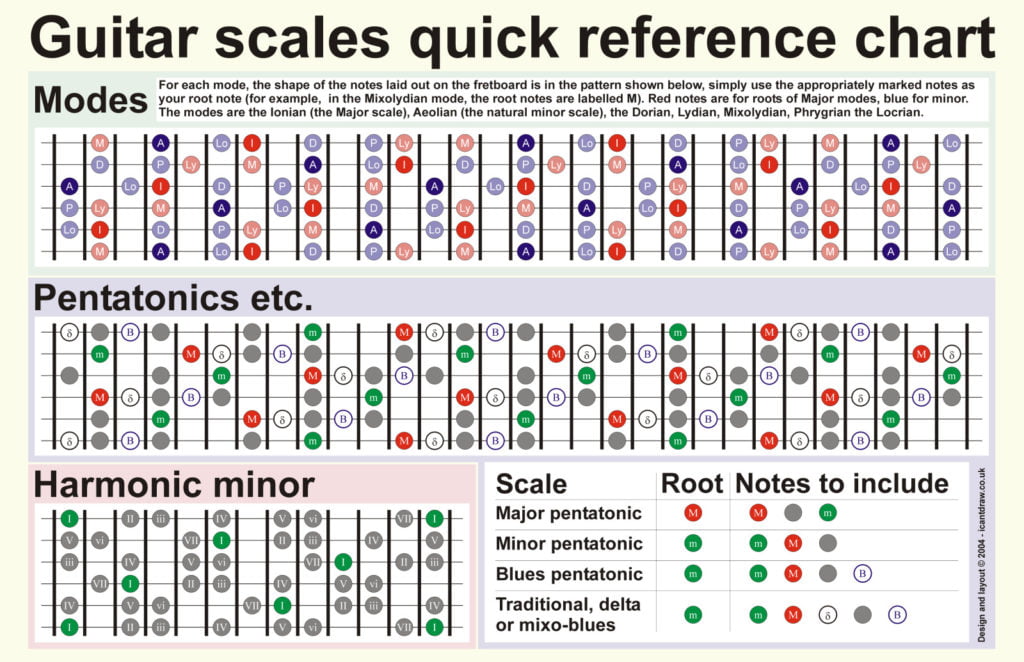Learning scales is one of the most fundamental aspects of becoming a proficient guitar player. While it may seem like a tedious task with little reward, the benefits of learning scales are numerous and significant. In this article, we’ll dive deeper into the importance of learning scales and explore the many benefits they provide.

Contents
7 Reasons to learn scales on guitar
Develop Your Ear
One of the most important benefits of learning scales is that it helps you develop your ear. By practicing scales, you become more familiar with the sound of each note and how it relates to other notes in the scale. This knowledge is crucial for playing melodies, improvising, and composing music.
When you learn scales, you’re essentially training your ear to recognize the sound of different notes and how they fit together. This is especially important if you want to improvise or write your own music. By knowing which notes sound good together, you can create interesting and unique melodies that fit within a given key.
Learn Songs Easier
Knowing scales also makes it easier to learn songs. When you know the notes in a scale, you can quickly find the notes you need to play when learning a new song. Similarly, understanding scales can help you construct chords and gain awareness of how to build them on your own. This knowledge can greatly speed up your learning process and help you become a more versatile musician.
For example, if you’re trying to learn a new song, knowing the scale that the song is in can help you quickly identify the notes you need to play. This can save you a lot of time and frustration when trying to learn new songs.
Build Finger Strength
Another advantage of practicing scales is that it helps you build finger strength and dexterity. Walking up and down the fretboard requires quick and precise movements, which can improve your ability to play songs, riffs, and leads. Additionally, many solos and riffs are based on notes and patterns from scales, so learning scales can help you start shredding in no time.
When you practice scales, you’re essentially doing finger exercises that help build strength and dexterity in your fingers. This can be especially helpful if you’re a beginner who is still developing your finger strength. By practicing scales regularly, you’ll notice a significant improvement in your ability to play more complex songs and solos.
Start Shredding
Many solos and riffs are based on notes and patterns from scales. By learning scales, you’ll have a better understanding of how these solos and riffs are constructed. This can help you start shredding in no time.
For example, if you want to learn how to play a particular solo, knowing the scale that the solo is in can help you identify the notes and patterns used in the solo. This can make it much easier to learn the solo and start shredding like a pro.
Learn Chords Faster
Understanding scales can also help you construct chords and gain awareness of how to build them on your own. This knowledge can be especially helpful if you’re interested in writing your own music or improvising.
When you understand how scales are constructed, you’ll have a better understanding of how chords are constructed as well. This can make it much easier to learn new chords and create your own chord progressions.
Write Songs
Scales provide a framework for creating original melodies. By using the notes in a scale, you can create unique and interesting melodies that fit within a given key. This can be especially helpful if you are interested in writing your own music.
For example, if you’re trying to write a new song, knowing the scale that you want to write in can help you create interesting and unique melodies that fit within that key. This can help make your music more memorable and engaging for your listeners.
Read Music
Finally, knowledge of scales is essential for reading music on guitar. The first step in reading music is understanding the notes on the staff and how they relate to the notes on the fretboard. Once you have this knowledge, you can start to read music and play songs from sheet music.
While this may seem like a daunting task at first, learning scales can make it much easier to read music on guitar. By understanding the relationship between notes on the staff and notes on the fretboard, you’ll be able to quickly identify which notes to play when reading sheet music.
In conclusion, learning scales is an essential part of becoming a proficient guitar player. While it may seem like a lot of work for little return, the benefits of learning scales are significant and long-lasting. So, if you want to improve your guitar playing skills, start practicing your scales today!
